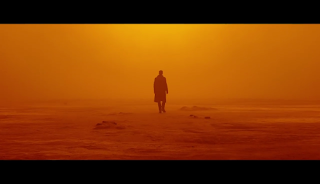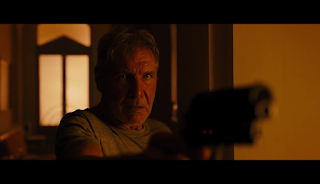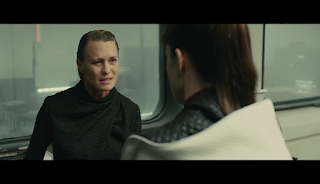 |
| He should have found a turtle. |
Right, now that I've got the
facetious version out of the way, let's get to the real review.
 |
| It's not a real sequel 'cause none of these got squeezed out. |
I have to admit that, despite
natural cynicism, aspects of Blade Runner
2049's marketing campaign worked on me, particularly the teaser. Seeing our
new protagonist, Ryan Gosling's Officer K, in an orange-tinted wasteland led me
to imagine that we were going somewhere new in this far-removed sequel, perhaps
to see something different. The full trailer impressed me less, as it seemed to
be going down a dramatic route which didn't seem particularly unusual, but I
was willing enough to see the film.
 |
| What if there's a big crowd on the bridge? |
Probably the best compliment I
can give to Blade Runner 2049 is that
it feels like a strong sequel to a slightly different film. I rewatched Blade Runner a few days before seeing
this, specifically the Final Cut, and having not watched the film in its
entirety for probably ten years I was reminded most strongly of how abstract
and dreamlike its tone is. The score by Vangelis is a major contributor to
this, of course, but the cinematography, including long, lingering shots, and
the performances, intentionally or otherwise, also create a haziness and
distance which focus the viewer primarily on the ideas the film is
contemplating, rather than a strong narrative, which the original notoriously
lacks. As a result, I found myself feeling increasingly convinced that making
an authentic-feeling sequel to Blade
Runner was impossible, that the characters and setting did not and could
not exist outside the boundaries of the text; the film accomplishes what it
sets out to do, and is complete. That's not to say that the film is perfect; it
is probably slower than necessary at points and arguably suffers from a
seemingly-uninterested performance by Harrison Ford and a lack of onscreen
chemistry between him and Sean Young, which makes the relationship between
Deckard and Rachael less interesting than it might otherwise be. Nonetheless
the excellent visuals and score and the performances of the replicant
characters, particularly Rutger Hauer as Roy Batty, are very compelling.
 |
| Probably paid over $5,000,000 per minute he was in the film. |
A good sequel preferably
expands upon or investigates new possibilities suggested by the original,
rather than simply rehashing what happened before, and it's to Blade Runner 2049's limited credit that
Ryan Gosling's K is not simply hunting down a fresh batch of rogue replicants,
perhaps with the assistance of Harrison Ford's Deckard. Rather, he is
investigating a possibility of replicants becoming capable of natural
reproduction, a situation which would threaten the humans' dominance over them
while simultaneously resolving their new manufacturer's supply problems.
Despite the fact that this is, ultimately, heavily related to Deckard and
Rachel's story from the original, it is certainly a different direction. The
extent to which we ought to give the film credit for avoiding this fairly
obvious pitfall is, however, worth bearing in mind.
 |
| I heard that to prepare for the role he bred a family of artificial humans and killed them all. |
To the same extent, that
direction itself is arguably less compelling than that of the original, in that
while the 1982 film's topic of interest is fundamentally existential, Blade Runner 2049 is to a greater extent
political, and while there is of course no bad time to warn of the potential
technological advancement has to enslave us, or to create new slaves, I can't
help but feel that this new film's concerns are ultimately more mundane than
the first. This perhaps is appropriate given how much more grounded the sequel
feels compared to the original, but also suffers in terms of the relative lack
of attention it receives, as the idea of the abuse and suffering of the
expendable replicants is only touched upon lightly until the concept of an underground
replicant resistance is, in my view, clumsily inserted into the film in the
final act. This left me, at least, thinking about the political ruminations of
the film despite the fact that so much is devoted rather to the growing inner
life of the protagonist, Officer K.
 |
| Not Emma Stone? |
Ryan Gosling generally has a
solid reputation and I feel like he was an appropriate casting choice for this
role. K's story is certainly interesting, although I can't help but wonder how
much it retreads that of both Rachael and Roy Batty in the original,
particularly in his search for truth and meaning in his life. As such, probably
the most engaging part I found to be the relationship between K, who is a
replicant, and his hologram companion, Joi, to the extent that I started to
think as I watched that a film about a relationship between two artificial life
forms would make for a better film than a story about replicants being able to
have babies. That being said, anti-replicant prejudice must be pretty bad if,
in this world, even Ryan Gosling would need to purchase an electronic
girlfriend.
 |
| At least banning plastic bags helped a bit. |
K's character development is
effective, as he transitions from a law enforcement killing machine to a man in
fear for his life to one who is disappointed when his subconscious desire to be
"special" is thwarted, to finally making a choice and acting to help
others, although I'm not entirely convinced of how striking the resolution is.
It's the steps in between which are arguably more memorable and perhaps not
followed through to the extent that they could be. Are we really that surprised
when K, a man of the law, decides to save Deckard from off-world torture so
that he can be reunited with his lost daughter? For me, at least, it lacks the
impact of Roy Batty's decision to save Deckard's life at the end of the
original. Given that we only see K retire one replicant in the course of the
entire film, the narrative appears to be drawn in morally simpler terms than
the original, which ties back to the political angle of the plot. Despite the
strength of Gosling's performance in particular, this made the film to me feel
equal parts redundant and simplistic in light of the original. Perhaps I would
perceive this differently if this was not a sequel, but it is. It's worth
noting that K's serial number and his nickname, Joe, both evoke the protagonist
of Kafka's The Trial, which arguably
has more in common with the tone and atmosphere of the original Blade Runner than this sequel.
 |
| If this reminds you primarily of Fallout: New Vegas, you need to read and watch more stuff. |
The strengths of the film,
beyond the performances, are primarily visual. Part of my homework for this
film, besides watching the original, was watching two of Denis Villeneuve's
recent works of apparent relevance: the 2016 sci-fi film Arrival, and the 2013 psychological thriller Enemy. This film is consistent with Villeneueve's strengths at
creating atmosphere, suspense and a feeling of unease, although as I've said I
think the atmosphere of the original is more fascinating. While I believe the
film has been criticised for being too slow, I personally found it to be paced
quite well, the lingering camerawork matching K's confusion and blunted
emotional state. The film also takes us beyond the rain-swept LA to a protein
farm, junkyard San Diego, snowbound Southern California, and atomic wasteland
Vegas. In all honesty I feel as if these settings, particularly the Vegas one,
deserved more use, and that the film ultimately spent too much time retreading
the streets of LA and the Tyrell building in particular. I still don't believe
they gel with the atmosphere of the original, but they're interesting enough on
their own. The most dubious visual is probably the elaborate means used to
depict Rachael in the film with the appearance of 1982 Sean Young. One could
make the excuse that she's meant to look fake, but that doesn't really change
the fact that she doesn't look like the real deal, and in the wake of this, Rogue One and the increasing number of
films which try to reuse the likenesses of older or even dead actors I suspect
we have a glut of trips down memory lane ahead of us.
 |
| "Who are we again? Am I a replicant?" |
 |
| "Two. Two. Four. And noodles." |
 |
| Part time. |
Blade Runner has been criticised for its limited narrative, but I
would argue that Blade Runner 2049
does too much to avert this. As I've said, the story seems to offer less room
for meditation upon loftier subject matters, and given the strength of the
visuals and some set pieces I'll discuss in a moment, it almost becomes a
distraction. Certainly, by the time K found Deckard, and perhaps earlier, I
felt that the iris of the narrative started to narrow more and more, taking the
film in a direction which I thought risked becoming too formal and too
structured in contrast to the best parts of the film when the stoic K stalks
through the collapsing world around him.
 |
| I think she's in the film more than Ryan Gosling. |
 |
| You wouldn't know he was a wrestler if it wasn't for his tiny head. |
 |
| Rather than 'Joe', she should have started calling him 'Special K'. |
No comments:
Post a Comment
Note: Only a member of this blog may post a comment.